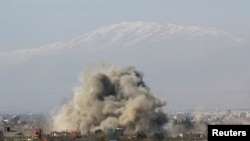Western news organizations say al-Qaida-linked militant groups have seized control of some of Syria's oil and gas resources, and are using the revenues to finance their operations.
The news organizations say the Islamic State of Iraq and al-Nusra are among groups that have carried out the practice, which in some cases, has included selling oil to the Syrian government.
The Telegraph [UK] and The New York Times cited unnamed Western officials for their reports.
On Wednesday, The New York Times also said there is "no clear evidence of tactical coordination" between President Bashar al-Assad's government and Islamist extremist groups. But, some U.S. officials have claimed the Syrian government has exempted the groups' sites from air strikes.
Daniel Serwer, a professor of conflict management at the Johns Hopkins School of Advanced International Studies, said the developments, if true, would not be surprising.
"War brings out the worst in people. It brings out greed. It brings out desires to take control of resources and nobody should be surprised if that is happening in Syria," he said.
Serwer said any Syrian government effort to buy oil from Islamist extremists may be partly motivated by an effort to undermine the more moderate Syrian opposition.
"If you are sitting in Damascus and you need oil, why wouldn't you buy it in a way that would hurt your opposition? It's two birds with one stone. I'm not surprised," he said.
Serwer, a retired U.S. diplomat, also is the author of Righting the Balance: How You Can Help Protect America.
The news organizations say the Islamic State of Iraq and al-Nusra are among groups that have carried out the practice, which in some cases, has included selling oil to the Syrian government.
The Telegraph [UK] and The New York Times cited unnamed Western officials for their reports.
On Wednesday, The New York Times also said there is "no clear evidence of tactical coordination" between President Bashar al-Assad's government and Islamist extremist groups. But, some U.S. officials have claimed the Syrian government has exempted the groups' sites from air strikes.
Daniel Serwer, a professor of conflict management at the Johns Hopkins School of Advanced International Studies, said the developments, if true, would not be surprising.
"War brings out the worst in people. It brings out greed. It brings out desires to take control of resources and nobody should be surprised if that is happening in Syria," he said.
Serwer said any Syrian government effort to buy oil from Islamist extremists may be partly motivated by an effort to undermine the more moderate Syrian opposition.
"If you are sitting in Damascus and you need oil, why wouldn't you buy it in a way that would hurt your opposition? It's two birds with one stone. I'm not surprised," he said.
Serwer, a retired U.S. diplomat, also is the author of Righting the Balance: How You Can Help Protect America.






